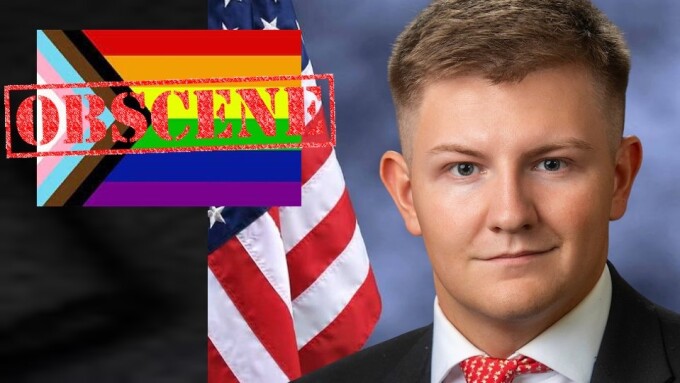HELENA, Mont. — The Montana House has endorsed a Republican bill aimed at restricting drag shows, which includes a legal redefinition of the term “prurient” as “having a tendency to excite lustful thoughts.”
As XBIZ has been reporting, codifying a legal definition of “prurient” is crucial to current Republican attempts to revive obscenity prosecutions.
Montana’s House Bill 359 is sponsored by Rep. Braxton Mitchell (R-Columbia Falls), a 22-year-old state legislator aligned with Charlie Kirk’s conservative group, Turning Point U.S.A., and with former President Trump’s MAGA movement. In his two years in office, Mitchell has received press attention for denying the results of the 2020 presidential election; for a controversial, ultimately failed attempt to designate “antifa” as a domestic terrorist group; and for tweeting images of the Proud Boys during the Jan. 6, 2021 insurrection.
On Thursday, HB 359 passed a preliminary vote 66-33, along partisan lines with all but one Republican supporting the bill, and was expected to pass the House today before heading to the Montana Senate.
Local station KTVH reported that Mitchell affirmed, “Our Republican caucus believes strongly that there is no such thing as a family-friendly drag show.”
Parts of the bill, which was amended after a House Judiciary Committee hearing earlier this month, replicate language used in more than 20 proposed pieces of legislation sponsored by Republicans across the country, purportedly aiming to “ban drag shows for children.”
A Crucial Redefinition of 'Prurient'
Tennessee’s version of the bill yesterday became the first one to clear both chambers of a state legislature and head to the governor’s desk. However, unlike Montana’s HB 359, Tennessee’s SB0003 — which expands the definition of “obscenity and pornography” to criminalize anyone who “engages in an adult cabaret performance on public property or in a location where the adult cabaret performance could be viewed by a person who is not an adult” and targets “male or female impersonators who provide entertainment that appeals to a prurient interest” — does not define the word “prurient.”
House Majority Leader Sue Vinton (R-Billings) also quoted blatantly homophobic and stigmatizing language from the committee hearing, which referred to some LGBTQ+ people as “groomers.”
An attempt by a Democratic representative to replace references to drag with the more general “adult-oriented performances” was opposed by Republicans, who said HB 359 would be weakened if it only prohibited performances “‘intended to appeal’ to a prurient interest,” KTVH reported, noting that the bill’s backers have asserted that “drag performances can’t be separated from sexuality.”
Taking Aim at the 'Miller Test'
Industry attorney Lawrence Walters, of Walters Law Group, explained to XBIZ in 2020 that the word “prurient” is defined in the law as “a shameful or morbid interest in sexuality.” Walters pointed out that obviously, adult businesses take the position that their content “does not involve a shameful or morbid interest in human sexuality, but a healthy one.”
The Nixon-era Supreme Court set the standard for judging obscenity in the 1973 case Miller v. California as, "Whether, to the average person, applying contemporary community standards, the dominant theme of the material … appeals to prurient interest."
This “Miller test” is used by courts all the way up to the United States Supreme Court for determining whether speech or expression can be labeled “obscene” and therefore not protected under the First Amendment.








